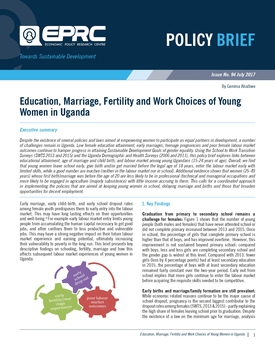Free Access | 2024-04-12
Education, Marriage, Fertility and Work Choices of Young Women in Uganda
Authors/Editors: Gemma Ahaibwe
Abstract:
Despite the existence of several policies and laws aimed at empowering women to participate as equal partners in development, a number of challenges remain in Uganda. Low female education attainment, early marriages, teenage pregnancies and poor female labour market outcomes continue to hamper progress in attaining Sustainable Development Goals of gender equality. Using the School to Work Transition Surveys (SWTS 2013 and 2015) and the Uganda Demographic and Health Surveys (2006 and 2011), this policy brief explores links between educational attainment, age of marriage and child birth, and labour market among young Ugandans (15-24 years of age). Overall, we find that young women leave school early, give birth and/or get married before the legal age of 18 years, enter the labour market early with limited skills, while a good number are inactive (neither in the labour market nor in school). Additional evidence shows that women (25-49 years) whose first birth/marriage was before the age of 20 are less likely to be in professional /technical and managerial occupations and more likely to be engaged in agriculture (majorly subsistence) with little income accruing to them. This calls for a coordinated approach in implementing the policies that are aimed at keeping young women in school, delaying marriage and births and those that broaden opportunities for decent employment.
DETAILS

Pub Date: July 2017
Document N0.: 94
Volume: 94
Published By: Economic Policy Research Centre
